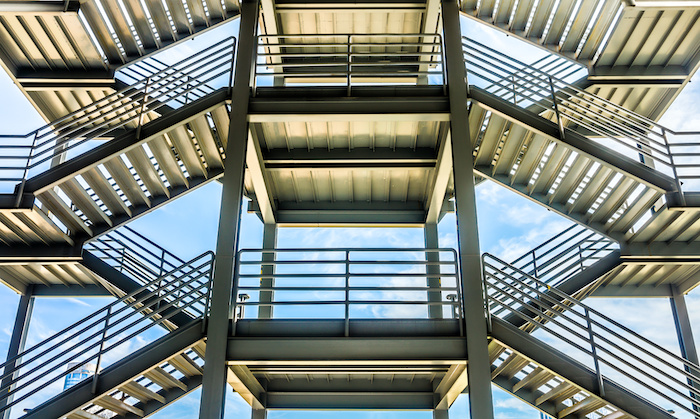
Stairs are integral to building design. Well-designed stairways can add value to any structure as it ensures users are safe and comfortable going up and down the steps. They also break up the monotony in modern buildings and even enhance their aesthetics. Apart from adding form and function to a building, it also serves as a cost-effective solution to move people and objects from one floor to another.
In commercial settings, stairs take on a more functional purpose inside and outside. They provide convenient access to mezzanines, lofts, elevated platforms, or useful additions in production, storage, or logistics halls. They can even serve as alternate routes or emergency exits. When industrial stairs are built in compliance with existing safety standards, they provide several advantages to building and business owners, employees, and even the environment.
Benefits of Industrial Stairs
Companies and businesses in multi-level buildings can benefit from installing industrial stairs. Several advantages include:
1) Safe And Convenient Route For Employees
Industrial stairs are often reserved for employee use. This restricted access ensures that only authorized personnel are the only ones who can use elevated platforms, access equipment, or check gauges on machinery. Aside from daily checkups, they make maintenance work easier for employees.
Stairs also connect floors and various landings and serve as a safe passageway for workers and equipment. They can be located inside production areas and storage facilities or outside logistics sites for greater convenience during transport and delivery of materials.
2) Cost-Effective Structure
Industrial stairways are often made from affordable yet durable materials such as steel and aluminum. They are cheaper but almost five times stronger than wood or concrete. They can withstand everyday use and additional weight when transporting equipment or other materials in and outside the building.
Aside from their tensile strength, steel staircases are also non-corrosive even when exposed to harsh elements. They also termite-resistant, do not rot like wood, or crack like concrete. They may even be coated with fire-proof paint to ensure that they can withstand heat and fire damage.
3) Custom Design
Industrial stairs can come from a catalog of standard designs that feature straight, with top landing, u-shaped, alternating tread, cross-over, or stair towers to suit the needs of various buildings and industries.
They may even be customized to ensure both function and aesthetics. Industrial stairs specialists can fit stairs into an existing building design according to user needs. They also consider which type of stairs is more efficient to save your workers’ time and energy. Designers also add coating or markings to ensure that they comply with local and industry safety standards. Contractors make sure that industrial stairs are safe and effective for workers and other individuals.
4) Fast And Easy Installation
Steel and aluminum stairs are fabricated as parts that can be assembled on site. These ready-made sections can be delivered to the property and easily installed. Aluminum stairs are lightweight, and some are even movable. Industrial steel staircases are also easy to set up and require little to no maintenance.
5) Environment-Friendly
Buildings often incorporate environment-friendly designs to contribute to conservation efforts. The steel used in commercial staircases is usually made from recycled industrial steel, which lessens a building’s carbon footprint and reduces the need to cut down trees.
Apart from being made from a sustainable material, staircases don’t require electricity to function, so it helps businesses save on utility costs. Industrial staircases are also durable and weather-proof in that they can last for a lifetime without needing replacements.
6) Provide Much-Needed Exercise
Nowadays, almost everyone sits on desks and typing away on computers or mobile devices all the time. Some industries automate tasks so that workers rarely get up from their workstations. However, some jobs still require frequent movement, such as manually checking machinery to ensure they work properly. Some may need to climb up the stairs to do maintenance work.
Workers benefit from going up and down industrial stairs since it gives them much-needed exercise. Regular flight strengthens their core muscles and helps keep their body toned and healthy.
Conclusion
Industrial stairs provide several advantages to building owners, companies, and employees. Staircases made from steel or aluminum are cost-effective solutions to keep buildings compliant with building standards.
Steel is often the preferred choice since it is durable, long-lasting, and environment-friendly. It also allows businesses to save on costs because it is ready-made and easy to install. Aside from its structural purpose, industrial stairs also make employees safe and provide them with practical ways to become fit and healthy while doing routine tasks.
